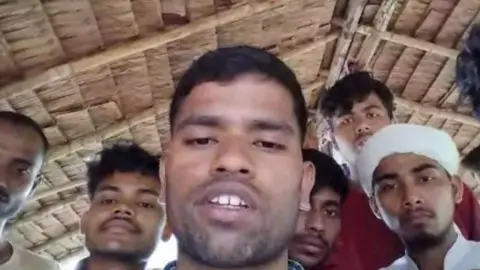The Indian government is threatening legal action against Sotheby's over an auction scheduled for Wednesday that features jewels believed to be linked to the remains of the Buddha. The highlighted gems were unearthed over a century ago alongside bone fragments in Piprahwa, a site associated with Buddha's birthplace. India asserts that the sale contravenes both Indian and international laws, labeling the jewels as sacred cultural artifacts that belong to its heritage. The ministry condemned Sotheby's collaboration with Chris Peppé, the current custodian of the jewels, claiming he cannot legitimately sell the items.
The treasures, discovered in 1898 by Peppé's ancestor, William Claxton Peppé, are said to include nearly 1,800 gemstones, discovered in a stupa at Piprahwa, which now resides in Uttar Pradesh. The Indian ministry has posted publicly available correspondence on social media outlining its grievances, which include a call for an official apology and the disclosure of all ownership records tied to the relics.
The ministry equates the planned auction to an act of "colonial exploitation" and insists the gems should be treated as integral to India's "inalienable religious and cultural heritage" instead of mere auction items. Sotheby’s has acknowledged the ministry's concerns, stating that the matter is receiving its full attention.
As the auction approaches, the debate surrounding ethical custodianship and cultural appropriation intensifies, with India vowing to initiate public campaigns against Sotheby's if it proceeds with the sale. Though Chris Peppé contends that selling the jewels is the most transparent avenue, India maintains that the treasures serve as symbols of spiritual significance deserving of proper reverence.
With the cultural tensions soaring, the outcome remains to be seen as the auction date nears.
The treasures, discovered in 1898 by Peppé's ancestor, William Claxton Peppé, are said to include nearly 1,800 gemstones, discovered in a stupa at Piprahwa, which now resides in Uttar Pradesh. The Indian ministry has posted publicly available correspondence on social media outlining its grievances, which include a call for an official apology and the disclosure of all ownership records tied to the relics.
The ministry equates the planned auction to an act of "colonial exploitation" and insists the gems should be treated as integral to India's "inalienable religious and cultural heritage" instead of mere auction items. Sotheby’s has acknowledged the ministry's concerns, stating that the matter is receiving its full attention.
As the auction approaches, the debate surrounding ethical custodianship and cultural appropriation intensifies, with India vowing to initiate public campaigns against Sotheby's if it proceeds with the sale. Though Chris Peppé contends that selling the jewels is the most transparent avenue, India maintains that the treasures serve as symbols of spiritual significance deserving of proper reverence.
With the cultural tensions soaring, the outcome remains to be seen as the auction date nears.






















